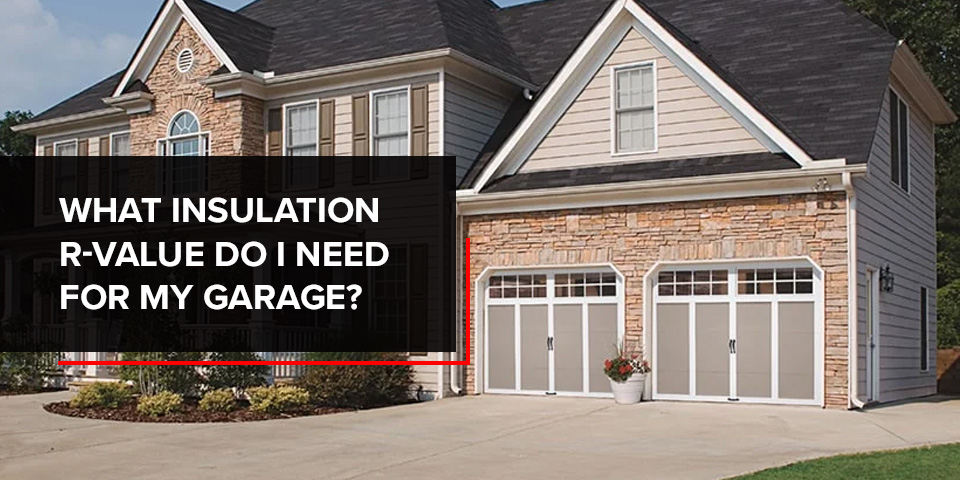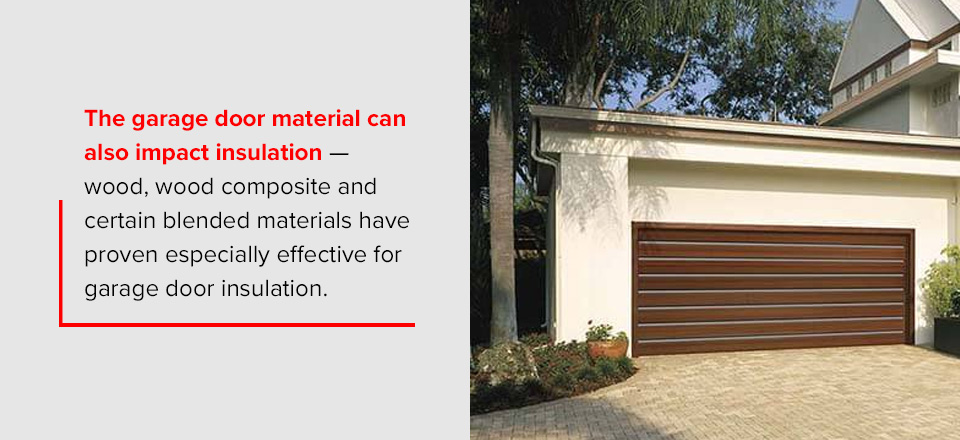What Insulation R-Value Do I Need for My Garage?
Your garage is one big storage unit, and your car probably isn’t the only thing you keep in it. You may be using it as a storage space for your tools, toys, equipment and other things that need protection from the outdoors. Perhaps you have even converted a section of your garage into a workshop or office space.
As with anything you need to store, you must regulate the temperature to ensure it is not too hot or cold inside to avoid creating a damp and moldy environment. For attached garages, this is even more essential, as the temperature in the garage can affect your home’s energy efficiency.
Garage door insulation R-value is a factor that’s important to consider when insulating your garage. Learn more about the best garage insulation R-value, the types of insulation for garages and what R-value your garage door needs.
How Does Garage Insulation Work?
Insulating your garage will help regulate the internal temperature, even in extreme external temperatures. If you have high temperatures in the summer or freezing temperatures in the winter, insualtion can help protect the interior of your garage from these temperature extremes so it’s warmer in the winter and cooler in the summer.
If you are considering insulating your garage, it is beneficial to do it in its entirety. The advantage of insulating your whole garage is that a larger insulated space will help retain the necessary amount of heat in winter and keep it cool in summer. However, if full insulation isn’t available, an insulated garage door can make a huge difference.
What Is R-Value?
Without getting too technical, R-value is the measure of how much heat is retained and slowly released in any insulation. This helps you regulate the temperature in your garage during the winter and summer and save on energy bills. Typically, if the R-value is higher, the insulating power increases. You would want to consider this if you are expecting a cold winter.
Types of Insulation for Garage Doors
There are many types of insulation for garage doors but we’ll focus on the most common two — polystyrene and polyurethane, which are both plastic-based polymers:
- Polystyrene: Polystyrene or styrofoam is cost-effective but has limitations, like the fact that it’s pre-cut in sheets and fitted to the garage door. It may not provide complete coverage and could let cold air in that would disrupt the flow and impact the temperature inside the garage.
- Polyurethane: Polyurethane is pricey, but it’s the preferred option when it comes to having the highest R-value garage door insulation. It is sprayed directly onto the garage door, creating an air-tight mold that prevents air from passing through.
The garage door material can also impact insulation — wood, wood composite and certain blended materials have proven especially effective for garage door insulation.
Other Things to Consider Besides Insulation
If you are looking for more options, you could consider other means to improve and enhance your garage door’s insulation. weatherstripping or weatherproofing and implementing measures to prevent thermal bridging.
Weatherstripping or Weatherproofing
Depending on where and what you want to seal, there are various options for weatherstripping to choose from. For garage doors, you would generally use tension seal or vinyl weatherstripping for the gaps at the bottom and sides of the door. These spaces can allow dust, rain, snow, debris and even small animals like mice and insects to enter your garage.
You may be able to apply your own weatherstripping, but it’s often best to have a professional service your garage door to ensure a good fit and proper application. With improper application, you may experience resistance when opening and closing your garage door.
Weatherstripping will last a few years, but you will likely have to replace it due to wear and tear, especially if there is substantial movement in and out of your garage or extreme temperatures.
Thermal Bridging
In a building structure, a thermal bridge enables an object to conduct heat at a higher rate compared to the elements around it. It could lead to occupants experiencing cold spots or sudden drops in temperature and cause moisture to develop into moldy areas. Your metal garage door may act as a thermal bridge since it conducts heat that flows inward and distributes unevenly, causing a fluctuation in the internal temperature.
You could combat this by insulating your garage door to regulate the rate at which heat is emitted. This will also impact the energy used to control the temperature in your garage, so you use less to make up for the loss.
What R-Value Does My Garage Door Need?
The insulated garage door R-value you will use depends on the type of door you have, including whether it is insulated or uninsulated and if your garage is attached to your home or not.
Detached Garage vs. Attached Garage
It is easy to understand the difference between a detached and an attached garage. A detached garage is isolated and separate from the main house structure. It often requires you to walk outside to access it, though you can construct a covered walkway to protect you from the elements. Attached garages are attached to the house structure, and often have an interior door that allows you to have direct access to the home.
Higher R-value insulation is important for attached garages because the temperature fluctuations can affect your home’s energy efficiency. If you use your detached garage as a workshop, insulation is also important so it remains comfortable — especially since many detached garages do not have HVAC connections to the main house.
Insulated Garage vs. Uninsulated Garage
If your garage is already insulated, that’s great! You will save costs associated with using your HVAC system and it also increases your home’s value due to the energy efficiency factor. Since it keeps your garage warmer in the winter and cooler in the summer, you can get more use out of the space.
However, you many not need an insulated garage door if you live in a moderate climate, or do not require temperature regulation.
Shop Our Selection of Insulated and Uninsulated Garage Doors
When it comes to deciding what R-value insulation is better for your garage, we are here to inform and help you all the way. At BlackHawk Garage Door, we are known for our remarkable service delivery, honesty, trustworthiness, reliability and experience.
If you want to know more insulated and uninsulated garage doors, check our website. You can also contact us to request an estimate or service.




